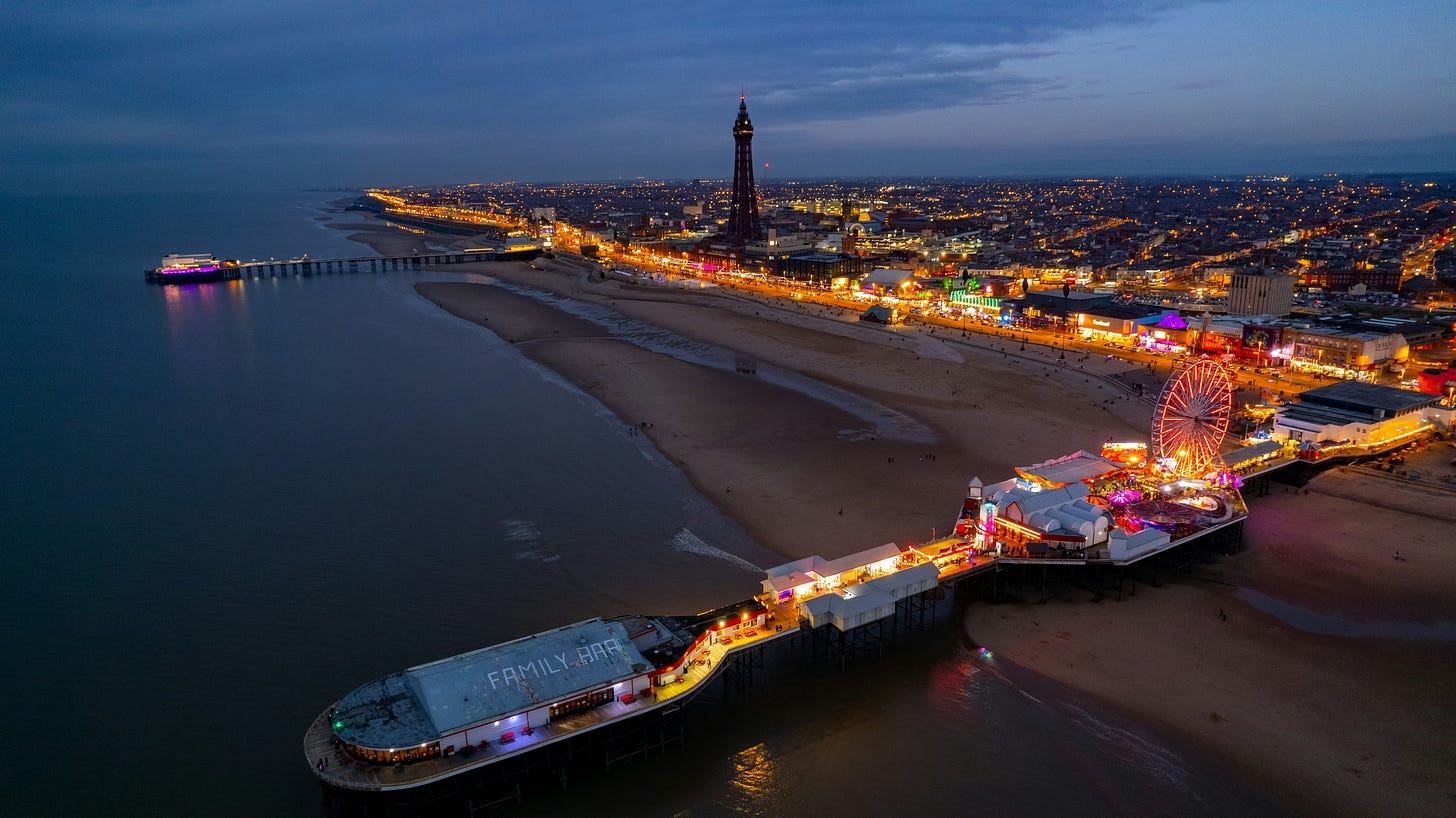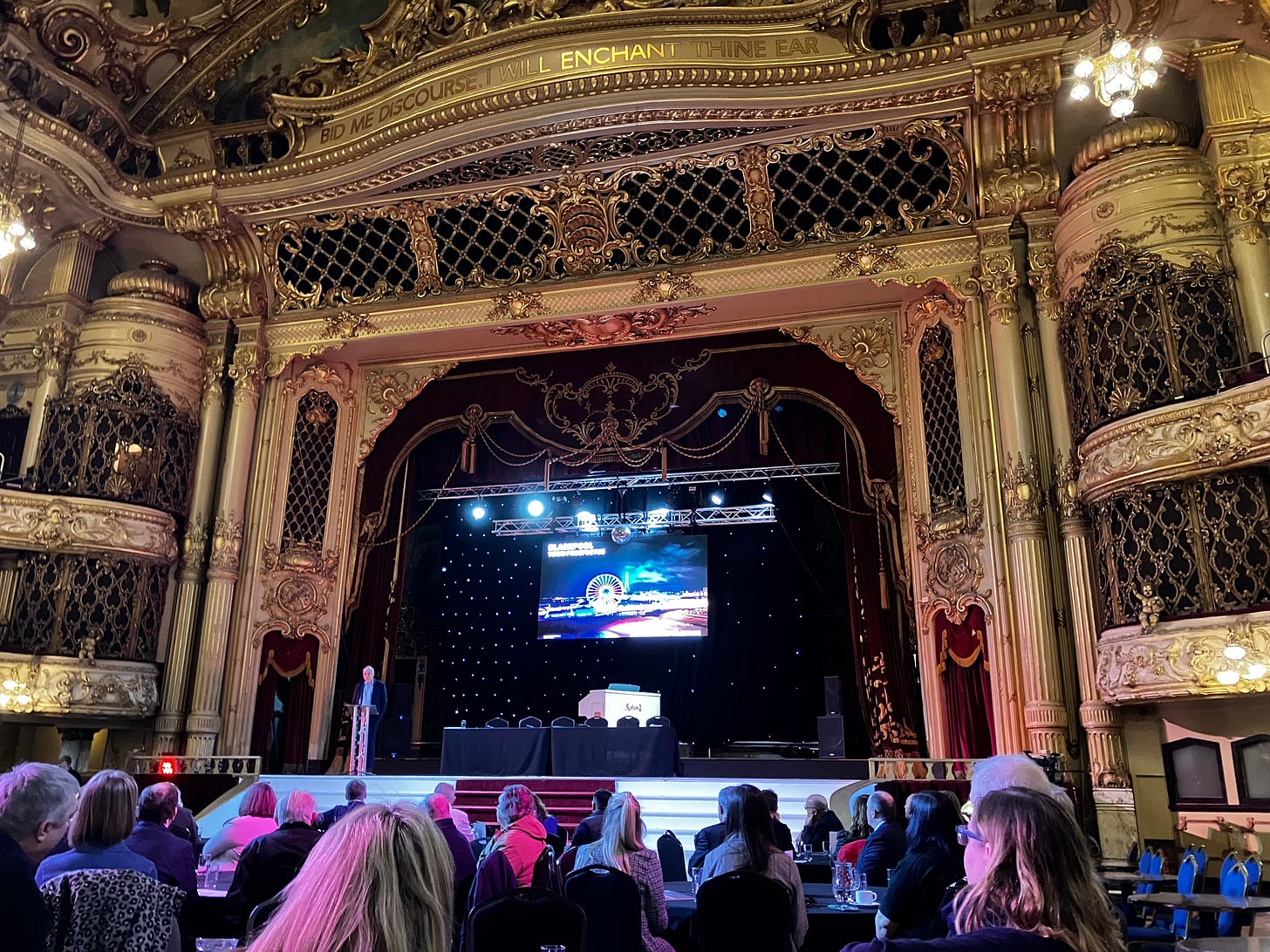Making Somewhere Home: From Tents to Town-wide Regeneration
The human instinct of placemaking - from people unhoused in a park, to ambitious plans to transform the fortunes of the UK’s favourite seaside resort - and the challenge for churches to get involved
“Good morning! Would you like to come in?”
I found myself in a local park. I’d had a couple of sips of my coffee, but it was still early in the morning on outreach in Blackpool with workers from the Council. The greeting from the man stepping out of his tent was a cheerful surprise. We were a bit nervous as we’d been asked to give the people sleeping in the small clearing behind the bushes a ‘heads up’. Enforcement action was planned, and a new Public Space Protection Order (PSPO)—another crude way to police the bodies of the unhoused who show up in places society doesn’t really want them—had been placed on the park. We hoped to avoid, or at least lessen, any distress that a confrontation with enforcement agencies might bring about. However, sometimes the message can be confused with the messenger. Fortunately, our worries were unnecessary.
“You can get through here. Don’t worry, you won’t get muddy. We’ve made a path!”
He beckoned us to an opening. He had indeed made a path with some bark chippings. Giving us reassurance about the mud underfoot, he guided us to the space they had made home. The word ‘made’ is important here since they had shaped the space to become more habitable. This created the opportunity to welcome us and also to show off what they had done. There was dignity in the orderliness of the space and an obvious pride in the landscaping. The message about enforcement was given with gentleness and received with grace. This grace, unexpected yet appreciated, was the day’s first lesson in humanity. My main lesson was realised only later, after we had bid each other farewell: that there is a deeply human and Christian call to transform spaces into meaningful places.

Although living on the edges of society, they still carved out a small space to call home. They exerted control over it. What was previously space became place through personalisation, social interaction, and functionality. Human experience was layered there, changing the appropriate mode of analysis from geography to biography. Life was being lived. However, that place was to return to its previous anonymity. It would lose its distinctiveness, stripped of the layers of meaning it had for the short time it was inhabited. Although it may sound nostalgic, it's clear that for those living in them, the tents were more than a makeshift solution. They symbolised a deep need to create a home, even in the toughest conditions. Experiencing long-term homelessness, they saw the park as an improvement over the exposed town-centre shop doorways, fully aware, however, of the hurdles in finding a stable home. They looked at their time in the park not just as a stopgap but as a respite in the journey towards a better future, even though they knew it wouldn't be quick. Their plans clashed with the reality of enforcement agencies, whose actions focused on moving them on quickly.
Their attempts to carve out a place of their own in the park are an expression of an impulse indelibly woven into the human condition: the need to make our environment our own. Just as birds intricately weave branches into nests and beavers architecturally sculpt their dams, we humans engage in this process to shape our environments to fulfil our needs. This instinctive behaviour is also an inherent drive to mould our surroundings to reflect our identity. These acts of placemaking not only alter our immediate environments to enhance our quality of life. They also influence the broader ecological and social landscapes in which we dwell. Indeed, a PSPO is part of that broader social landscape. So too was our outreach. The reciprocal relationship between humans, habitats, and other humans highlights how our endeavours to create 'home' extend beyond mere physical modifications. They are the very fabric of our communities and ecosystems. By transforming spaces into places imbued with meaning and purpose, we participate in an ongoing dialogue with the world that shapes both our development as individuals and the collective evolution of our surroundings.

It is a sentiment I know myself. Having frequently moved home in my youth, like many who search for a place to belong, I am acquainted with the need to craft home anew. As a child, it was putting up familiar football posters on my bedroom wall. As an adult, it is a reshuffling of the living room furniture, which my wife graciously accepts. Intriguingly, my grandmother, whom I know only through stories as she died before my birth, shared this ritual of rearranging her lounge. It is a compelling idea that such behaviours might form part of our genetic makeup, passed along generations, silently teaching us habits to create home. Perhaps this impulse is heightened by our dwelling not being our own but rather a provision by The Salvation Army to fulfil our commitments as Salvation Army officers. This rearrangement ritual becomes a prayer in action, making space into place again. It is a home not owned by us but held in trust, reminding us that our role in the community is both temporal and purposeful, and our residence a testament to service over possession.
Indeed, the idea of Christian stewardship extends beyond spiritual matters to include caring for our physical environment. None of us are truly outright owners of our habitat. This is particularly accentuated in the Christian life, where we recognise our primary citizenship as the eternal Kingdom of God rather than the constructs of this world. In bringing a semblance of ‘home’ to our surroundings, our actions evoke the desire of people in exile who are sojourning through the world while having their hearts fixed on the eternal. Jeremiah 29 offers a framework for this experience of ‘exile’. In this biblical narrative, exiles are instructed not just to survive, but to thrive. They are to contribute to the community’s welfare, or shalom, the Hebrew word for a life of fullness that encompasses dynamics ranging from the spiritual to the material, and the emotional to the political. It encourages us not merely to exist but to actively ‘settle down’ and engage in the cultivation of our environment. Our faith compels us not just to inhabit, but to improve, to bless, and to transform. This exhortation to contribute to the fulness of human experience expressed as shalom underscores the dual nature of the Christian's and, fundamentally, the human’s existence: engaged, yet expectant; grounded, yet yearning for our true home.
Placemaking is about transforming both individual spaces and entire communities, such as towns and cities in need of rejuvenation. An example of such transformation is seen in Blackpool, a town with a rich history, now on the brink of significant change. The Blackpool Pride of Place Partnership, formed seven years ago, underscores this through its recent event at the Blackpool Tower Ballroom, launching the Town Prospectus for 2024. This event showcased the combined efforts of both the private and public sectors to achieve their shared goals. The latest prospectus, the fourth of its kind, highlighted the progress from mere ideas to tangible achievements. Much like the pride the unhoused man showed in his makeshift chipwood path, the presentation highlighted with rightful pride the transformation of concepts from the initial prospectus—once mere computer-generated images—into tangible buildings and projects now existing in reality. This larger-scale transformation reflects a universal need to adapt our environments for the better, mirroring the individual acts of placemaking, like those seen in a morning outreach in the park. The practical challenge is how the instincts and dreams of the unhoused man, currently manifest in a little bark footpath, might be better translated into the wider process of town-wide identity. This process often leaves even the most engaged people feeling overlooked, especially those trapped in the cycle of homelessness, unable to see beyond immediate survival. It is here that the Christian community should sense a call to participation.
Just as the church will be called to extend support to a person without a home, we are similarly obliged to play a role in the broader scope of regeneration efforts by helping the voiceless find their voice, and amplifying it. Our stewardship extends beyond mere occupation of space; it is a call to play a bold role, engaging confidently and constructively with decision-makers and policy-shapers to help resist the secular tendency towards inequity. The Christian’s vocation to sojourn purposefully intersects with a civic duty to nurture spaces that promote the well-being of all residents, but with a particular bias towards those who are voiceless. In the context of Blackpool, invoking the spirit of Jeremiah 29:7, we are urged to ‘seek the shalom of Blackpool... and pray to the Lord on its behalf, for in its shalom you will find your shalom.’ This noble endeavour to move the ‘World As It Is’ to the ‘World As It Should Be’ is transformative. It not only reshapes our communities but also refines our own character from ‘Who I Am’ to ‘Who I Should Be’. This fusion of spiritual odyssey and community involvement epitomises Christian discipleship. Placemaking, then, can be an act of faith and dedication, not merely shaping physical landscapes but also weaving a spiritual fabric that enriches the collective identity of our communal life by including those on the edge, like people in tents in a park.

This principle transcends the specific context of Blackpool. The mission of placemaking knows no bounds: from the local county to the national landscape, and even the global stage. The shaping of space into home is a fundamental instinct relevant to all, from an unhoused neighbour to residents of a town like Blackpool to the Christian sojourning in the world. The church has an invaluable role to play in this effort, serving as both a consistent presence in a place undergoing upheaval and being a catalyst for change, but most particularly an avenue for participation for those we might consider to be ‘the least of these’ - the homeless man; the battered girlfriend; the addict; the asylum seeker; the kid excluded from school; the lonely older person. By embracing this call, the church upholds its commitment to being a faithful community and fostering belonging. It also participates in the divine act of creation, shaping the world to reflect God’s love and grace. Through this sacred duty, the church contributes to spaces becoming places of shalom. Indeed, without ‘the least of these’ playing a part, true shalom is not possible. By partnering with other local organisations through broad-based community organisations, initiating housing projects, or advocating for policy changes, the church can materialise its vision to make earth a bit more like heaven. Examples from communities where churches have led or participated in urban regeneration efforts demonstrate the transformative power of faith in action, turning spaces of neglect into thriving places of community and support.
From the personal touch of a man creating pathways in a park, to my relocating of household furniture, to the communal efforts in Blackpool's regeneration, we witness a profound truth: that shaping our world to become home is not just an act of physical transformation but an expression of deep spiritual yearning, which is, fundamentally, to know that the Kingdom of God is among us.





Thought & action provoking